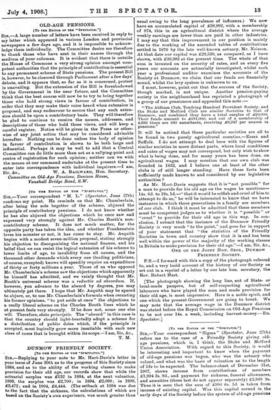[To Till EDITOR Or TOR "Sr sarAroa."] SIR,—Your correspondent "M.
L." (Spectator, June 27th) confirms my point. He reminds us that Mr. Chamberlain, after being the sole begetter of the scheme, abjured the principle of contributory pensions. I do not know whether he has also abjured the objections which he once saw and expressed very strongly against Mr. Charles Booth's non- contributory scheme. It does not much matter, for the opposite party has taken the idea, and whether Frankenstein loves his monster or not, it has come to stay. Mr. Asquith begins with a modest seven-million proposal, stating strongly his objection to disorganising the national finance, and his belief that we can resist the logical extension of his scheme to lower limits of age, to invalidity from all causes, and the thousand other demands which every one (leading politicians, of course, excepted) knows will speedily require an expenditure of thirty or forty millions a year. Those of us who opposed Mr. Chamberlain's scheme saw the objections which apparently he himself has admitted, and we vainly thought that Mr. Booth's universal scheme was a reductio ad absurdum. If, however, you advance to the absurd by degrees, you may ultimately get there. I hope that Mr. Asquith may be spared to abjure, or, to use Mr. Chamberlain's formula when recanting his former opinions, "to put aside at once" the objections to a really liberal scheme on the Charles Booth lines which he at present feels very strongly. If he does not, some one else will. Therefore, obsta principiis. The "absurd" in this case is that the country should light-beartedly adopt a scheme for a distribution of public doles which, if the principle is accepted, mast logically grow more insatiable with each new class of cases that is brought within its scope.-4 am, Sir, &c.,
T. M.


















































 Previous page
Previous page